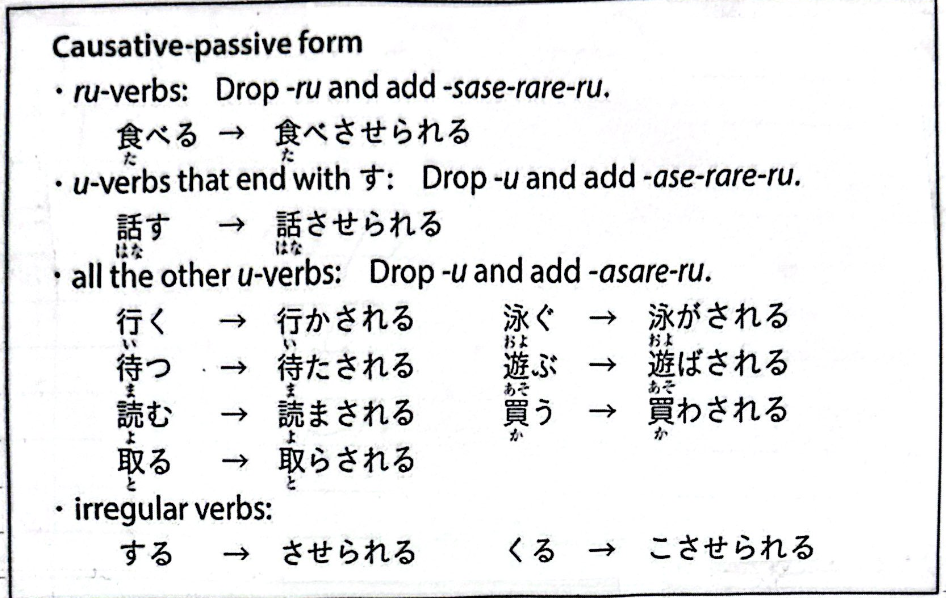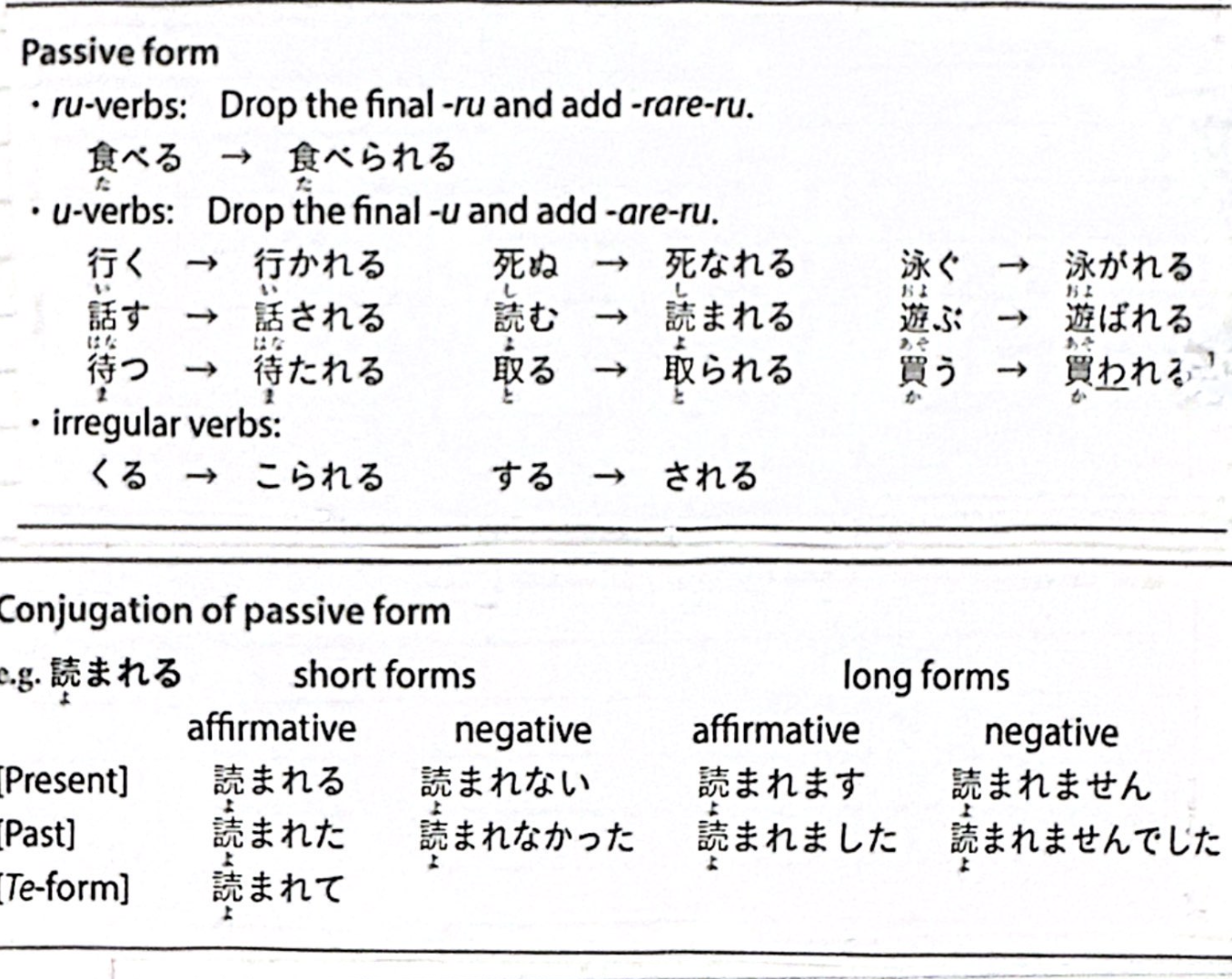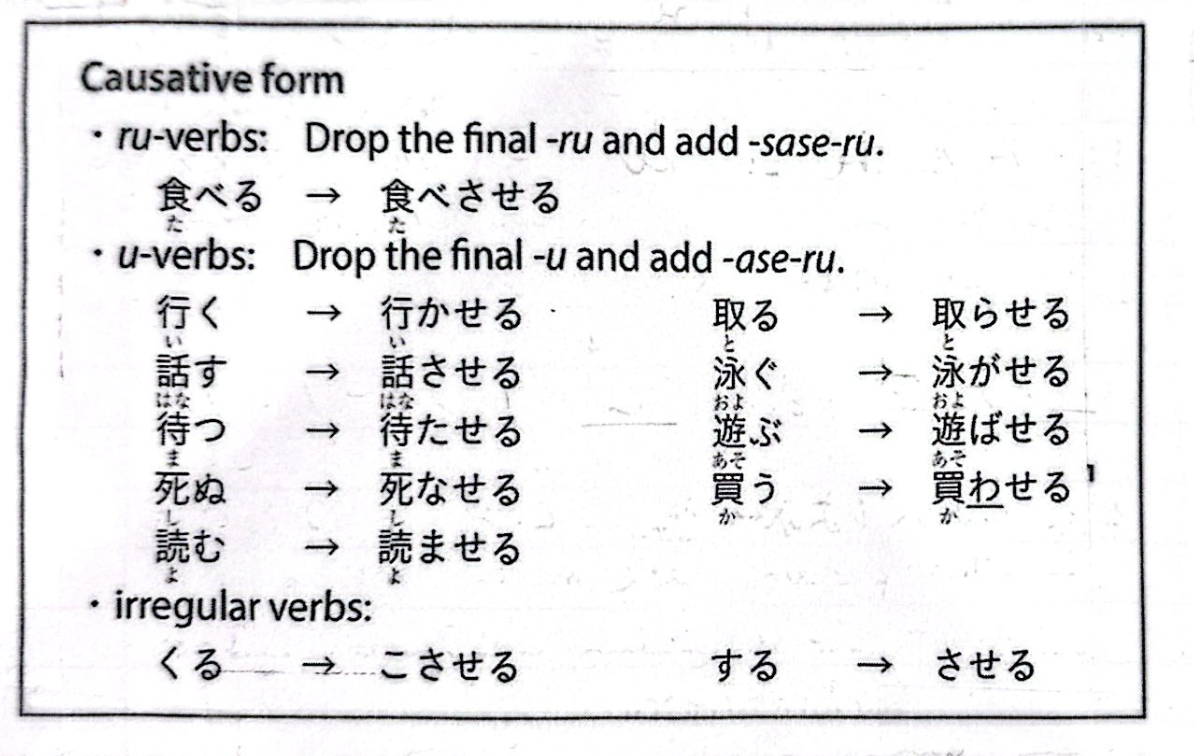L.7 –– L.23 Grammar Structures Cumulative
1/442
There's no tags or description
Looks like no tags are added yet.
Name | Mastery | Learn | Test | Matching | Spaced |
|---|
No study sessions yet.
443 Terms
I was forced to carry a bag by my boss.
私わ部長にかばんをはこばされました。
I was forced to sing a song.
歌を歌わされました。
I am always forced to eat my vegetables.
いつもやさいを食べさせられました。
causative-passive conjugation rules
ru-verbs: drop -ru and add -sase-rare-ru
u-verbs that end w/ す: drop -u and add -ase-rare-ru
all the other u-verbs: drop -u and add -asare-rus
する —> させられる
来る —> 来させられる

causative-passive form sentence structure
[puppet] は [puppet master] に [action]
(the subject before は here is the same as a regular, noncausative, nonpassive sentence; aka the opposite of a passative or causative sentence).
〜ても sentence structure
[A (te-form)] + も + [B]
We will have a BBQ, even if it rains.
雨がふっても、バーベキューをします。
I will not turn on the A/C, even if it’s hot.
あつくても、アイコンをつけません。
〜ても conjugation structure
verbs: te-form (negative: なくても usually)
な-adj. and nouns: use でも instead of ても (UNLESS negative: じゃなくても usually works… ish)
い-adj.: く trick (adverb form… ex: さむくても) (negative: くなくても usually)
I have decided to buy a new house.
新しい家を買うことにしました。
I won’t complain from now on.
これからもんくを言わないことにします。
I have decided to continue my study of Japanese/Japanese studies.
日本お勉強を続けることにしました。
I have decided to get up early and go jogging.
早く起きして、ジョッギングすることにしました。
I have made it a rule/habit to get up early and go jogging.
早く起きして、ジョッギングすることにしています。
“have decided to do” structure
[V(short form)] + ことにする
〜ことにしました —> “I have decided to do [thing]”
〜ことにしています —> “I make it a habit/rule to do [thing]”
〜ことにします —> “I have just now decided to do [thing]”
〜ことにしよう —> “I have decided to do [thing] [after much discussion]”
[After discussion], we have decided to take a trip abroad this summer.
今年の夏は海外旅行に行くことにしよう。
I have made it a rule/habit not to talk behind someone’s back.
私は悪口を言わないことにしています。
“until X” sentence structure
[V(short form)] + まで
Note: the verb here must always be in positive short form, never negative.
Until it clears up [outside], I will wait in the café.
はれるまで、カフェで待ちます。
I won’t quit baseball until [my team] wins a championship.
ゆうしょうするまで、やきゅうをやめません。
“how to do X” sentence structure
[V(masu stem)] + 方
“how to do X” conjugation rules
if the verb is a する verb、then the を before the verb becomes a の. Additionally, add a の before the する. Then, the します changes to し方. Regular verbs that involve を simply have the one を turned into の.
(ex.: 日本語の勉強のし方 —> how to study Japanese).
how to swim
およぎ方
how to use chopsticks
はしの使い方
“the way people think” or “how to think [about something]”
考え方
how to read kanji
漢字の読み方
how to book a hotel room
ホテルのよやくするのし方。
how to study Japanese
日本語の勉強のし方
There are many ways to eat this vegetable.
このやさいの食べ方はいろいろあります。
Could you please teach me how to write this kanji? [formal]
この漢字の書き方を教えていただきませんか。
How to go to the airport
空港の行き方
The way Tanaka eats ramen is interesting.
田中さんおらめんお食べ方はおもしろいです。
I don’t know how to use this app.
このアプリの使い方がわかりません。
Please explain how to order.
ちゅうもんのし方をせつめしてください。
〜ために sentence structure
[noun] + の + ために + [rest of sentence]
What do you do for your health?
けんこうのために、何をしていますか。
passive sentence structure
[victim]は[villain]に[evil act]
passive form conjugation
ru: drop final ru and add rare-ru
u: drop final u and aded are-ru
irregular: 来る—> 来られる and する—>される

I had my wallet stolen.
さいふをぬすまれました。
I had my car used by my friend (and I’m upset about it).
私は友だちに車をつくわれました。
I heard that Professor Yamashita had his password stolen by someone.
山下先生はだれかにパソワードをねすまれたそうです。
something has been done (and kept that way).
〜が + verb + てある
because it is cold, the heater is on [and has been kept that way]
さむいので、ヒーターがつけてあります。
flowers are on the table [and have been kept there]
テーブルの上に花がおいてあります。
bread has been bought [and is still there]
パンをが買ってあります。
something happens during another longer event.
[event A] + [たらいる] + 間に + [event B]
おふろに入っている間に電話がありました。
there was a phone call while i was in the bath.
昨日の夜、練っている間にじしんがありました。
there was an earthquake while i was asleep last night.
つめたいする
to make something colder
よくする
make something better
かんたんにする
make something easier / simpler
すぎの試験はやさしくしてください。
please make the next exam easier.
みんなで世界をよくしましょう
let’s all make the world a better place.
I want [person] to do….
[私は] [person に ] [V(te-form)] ほしい
私は病気の友だちに元気担ってほしいです。
I want my sick friend to get well.
私はルームメイトに宿題を手伝ってほし買ったです。
I wanted my roommate to help me w/ my homework.
NEGATIVE form of “i want someone to do something”
〜ほしくないです OR [verb negative]ほしいです。
私はお父さんに昔の話をして欲しくないです。
I don’t want my dad to tell stories about the old days.
私は日本人の友だちに英語で話せないでほしいです。
I dont want my japanese friend to speak in english.
なんども(何度も)
how many times? / many times doing a thing
一も+ negative verb (一度もありません)
not even once / i havent done it even once
[director] は [cast] に [thing]
“I made someone do something”
私は弟ににもつをはこばせました。
I made my little brother carry my luggage
子供を先生に合わせました。
I made my child meet his teacher. (hint: multiple にs rule)
causative form conjugation
ru: drop ru, add sase-ru
u: drop u, add ase-ru
irregular: 来る—>来させる and する—>させる

先生は私をトイレに行かせました。
The professor made me go to the bathroom (hint: multiple にs rule)
“let someone” structure
causative + てあげる / てくれる / てもらう
“please let me do something”
causative + てください
先生は私に英語を話させてくれませんでした。
the prof didn’t allow me to speak in english.
私にこの仕事をやらせてください。
please let me do this job. (hint: やる = “to do / perform” )
firm command form
V(masu stem) + なさい。
The father let his children live alone.
お父さんは子供に一人ぐらしをさせてあげました。
一人ぐらしをさせてください。
please let me live alone.
if i study a lot, I can get a good grade.
たくさん勉強すれば、いいせいせきがとれます。
if ___, then (good result)
[clause A] 〜ば [clause B]
たんごを覚えれば、大じょうぶでしょう。
If you memorize the vocab, youll be fine.
despite A, B is true”
Thing A[short form]* + のに + thing B
*if a noun or na-adj, this means ending in な.
八時間も勉強したのに、試験ができなかった。
I studied for 8 hours, but i still couldn’t do well on the exam.
田中さんはしんせつなのに、山田さんは田中さんがきらいです。
Even though tanaka is nice, yamada dislikes her.
X is like Y (comparison statement)
[thing A] のように [thing B]
X is like Y (example statement)
[thing A] のような [thing B]
メアリーさんは魚のように上手におよげです。
Mary is very skilled at swimming, like a fish.
アントニオさんはそんごくのようにうよいです。
Antonio is strong like Son Goku.
私はかまくらのような町が好きです。
I like towns like Kamakura.
走れば、電車にまにあいます。
If i run, i will catch the train. (lit. make it in time)
どこにいけばいいですか。
where should i go? (lit. where would it be good for me to go?)
もう十時なのに、帰れません。
despite it being 10:00, i can’t go home.
honorific verb for いる
いらっしゃる(いらっしゃいます)
honorific verb for いる
いらっしゃる(いらっしゃいます)
honorific verb for 来る
いらっしゃる(いらっしゃいます)
honorific verb for 食べる
めしあがる(めしあがります)
honorific verb for 飲む
めしあがる(めしあがります)
honorific verb for くれる
くださる(くださいます)
honorific verb for する
なさる(なさいます)
honorific verb for ねる
お休みになる(お休みになります)
honorific verb for 見る
ごらんになる(ごらんになります)
honorific verb for 言う
おっしゃる(おっしゃいます)
honorific verb for 〜ている
〜ていらっしゃる(〜ていらっしゃいます)
what characters go before honorific forms of する?
ご or お. ご is used w/ most kanji compounds, while お is used w/ japanese origin words and a few common kanji compounds.
Around what time will you be coming to work tomorrow? [literal:
coming to the company”]. [honorific]
明日何時ごろ会社にいらっしゃいますか。